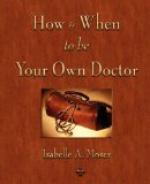Dr. Jennings operated differently. He would prescribe one or two secret medicines from his black bag and instruct the patient to stay in bed, get lots of rest, drink lots of water, eat little and lightly, and continue taking the medicine until they were well. His cure rate was phenomenal. Demand they might, but Dr. Jennings would never reveal what was in his pills and vials. Finally at the end of his career, to instruct his fellow man, Dr. Jennings confessed. His pills were made from flour dough, various bitter but harmless herbal substances, and a little sugar. His red and green and black tinctures, prescribed five or ten drips at a time mixed in a glass of water several times daily, were only water and alcohol, some colorant and something bitter tasting, but harmless. Placebos in other words.
Upon confessing, Dr. Jennings had to run for his life. I believe he ended up retiring on the western frontier, in Indiana. Some of his former patients were extremely angry because they had paid good money, top dollar for “real” medicines, but were given only flour and water. The fact that they got better didn’t seem to count.
If the physicians curative procedure suppresses the symptom and/or lowers the vital force with toxic drugs or surgery, (either result will often as not end the complaint) the allopathic doctor is practicing bad medicine. This doctor too will have a high cure rate and a good business (if they have an effective bedside manner) because their drugs really do make the current symptoms vanish very rapidly. Additionally, their practice harmonizes with a common but vicious dramatization of many people which goes: when a body is malfunctioning, it is a bad body and needs to be punished. So lets punish it with poisons and if that don’t work, lets really punish it by cutting out the offending part.
However, if the physician can do something that will do no harm but raises the vital force and/or lowers the level of toxemia, this doctor will have a genuine cure rate higher than either of the two techniques. Why does raising the vital force help? Because it reduces enervation, improves the digestion, lowers the creation of new toxins and improves the function of the organs of elimination, also reducing the toxic overload that is causing the complaint.
Techniques that temporarily and quickly raise the vital force include homeopathy, chiropractic, vitamin therapy, massage, acupuncture and acupressure and many more spiritually oriented practices. Healers who use these approaches and have a good bedside manner can have a very good business, they can have an especially-profitable practice if they do nothing to lower the level of toxemia being currently generated. Their patients do experience prompt relief but must repeatedly take the remedy. This makes for satisfied customers and a repeat business.




